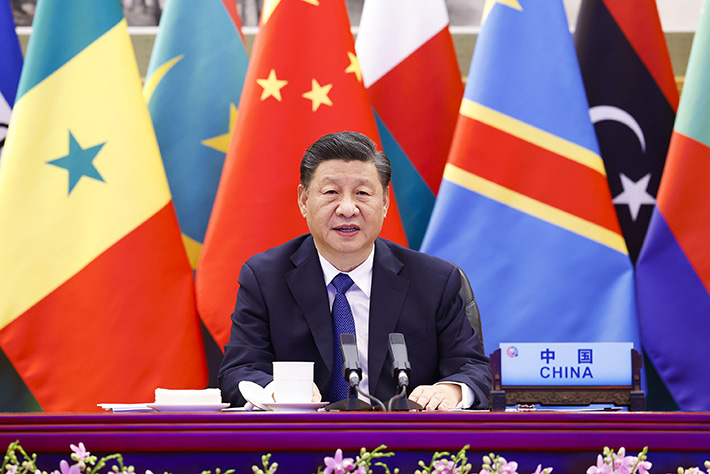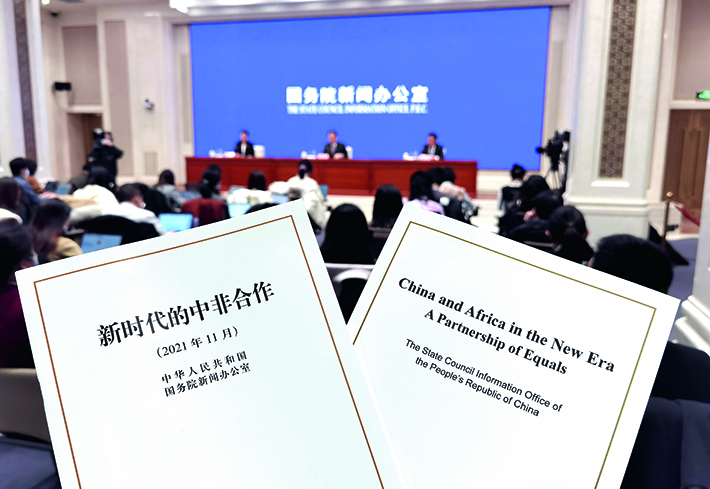|
||||||||||
| Home Nation World Business Opinion Lifestyle ChinAfrica Multimedia Columnists Documents Special Reports |
|
||||||||||
| Home Nation World Business Opinion Lifestyle ChinAfrica Multimedia Columnists Documents Special Reports |
| ChinAfrica |
| A Flourishing Framework |
| FOCAC meeting pins down plans for future China-Africa cooperation. |
| By HU FAN VOL. 14 JANUARY 2022 ·2022-01-05 |

Chinese President Xi Jinping speaks at the Eighth Ministerial Conference of FOCAC via video link on November 29, 2021 (XINHUA)
Despite the impact of the COVID-19 pandemic, the Eighth Ministerial Conference of the Forum on China-Africa Cooperation (FOCAC) was held as scheduled on November 29-30, 2021 in Dakar, Senegal. Pragmatic and efficient discussions on the theme of the conference were carried out and broad consensus was reached, according to Chinese State Councilor and Minister of Foreign Affairs Wang Yi.
Speaking at a joint press conference with his Senegalese counterpart Aissata Tall Sall at the close of the conference, Wang said that the conference reviewed the achievements made in the development of China- Africa relations and China-Africa solidarity in fighting the COVID-19 pandemic since the FOCAC Beijing Summit in 2018, deliberated the implementation of the Eight Major Initiatives announced at the Beijing summit, and adopted an array of outcome documents. Established in October 2000 at its first ministerial conference in Beijing, FOCAC has now become an important platform for dialogue between China and Africa and an effective mechanism for pragmatic cooperation. It also serves as a pacesetter for bilateral cooperation.
FOCAC now has 55 members comprising China, the 53 African countries that have diplomatic relations with China, and the African Union (AU) Commission. The FOCAC Ministerial Conference is held once every three years, rotating between China and African countries, and co-chaired by China and an African hosting country, with the co-chairs also taking the lead in implementing conference outcomes.
Three of the previous seven ministerial conferences were upgraded into summits, namely the Beijing Summit in November 2006, the Johannesburg Summit in December 2015, and the Beijing Summit in September 2018. These conferences released a series of important documents and promoted the implementation of a series of key measures. This latest conference saw the adoption of the Dakar Action Plan (2022-24), with focus on health, infrastructure, digital economy, green development, trade, investment and capacity development, among others. Four outcome documents were also adopted during the conference. “The success of the conference confirms the strong will of China and Africa to work together to overcome difficulties and seek common development, and shows the huge potential and bright prospects of China-Africa cooperation,” Wang said.

Students draw water from a Chinese-built well in a primary school in Gwanda, Matabelaland South Province, Zimbabwe, on November 3, 2021 (XINHUA)
China’s commitments
In his speech delivered via video link at the opening ceremony of the conference, Chinese President Xi Jinping said that China and Africa had jointly prepared the China- Africa Cooperation Vision 2035 and that for the first three years planned in the vision, China will work with African countries to implement nine programs.
With the Omicron variant of COVID-19 virus raging across the world, medical and health program has been prioritized. To help the AU achieve its goal of vaccinating 60 percent of the African population by 2022, China will provide another 1 billion doses of vaccines to Africa, including 600 million doses as donation and 400 million doses to be provided through means such as joint production by Chinese companies and relevant African countries. “We need to put people and their lives first, be guided by science, support waiving intellectual property rights on COVID-19 vaccines, and truly ensure the accessibility and affordability of vaccines in Africa to bridge the immunization gap,” Xi said.
Other programs include poverty reduction and agricultural development, trade promotion, investment promotion, digital innovation, green development, capacity building, cultural and people-to-people exchange, and peace and security.
“Once again, these programs are designed to provide what is urgently needed in Africa,” said Zhou Yuyuan, Researcher at Shanghai Institute for International Studies, in an interview with ChinAfrica. He added that a majority of these programs are formulated as assistance, taking into consideration the financial difficulties African countries may face.
Zhou said that compared to proposals made in previous FOCAC conferences, the nine programs show increased emphasis on improving African countries’ inherent capacity to grow. Apart from the capacity-building program, which focuses on education and training, the other programs will also directly or indirectly help African countries build their capacity.
“For example, expanding imports from Africa may help promote industrialization on the continent; the green program is to improve Africa’s ability to respond to climate change; and the peace and security program can improve Africa’s ability to maintain security,” he explained.
These programs are just for the first three years of the China-Africa Cooperation Vision 2035. “They are part of a long-term plan. This shows increased focus on the strategic development of China-Africa cooperation,” Zhou said.

China’s State Council Information Office issued the white paper China and Africa in the New Era: A Partnership of Equals in Beijing on November 26, 2021 (CNSPHOTO)
Sharing Chinese experience
On November 26, 2021, three days before the FOCAC conference opened, China’s State Council Information Office issued a white paper titled China and Africa in the New Era: A Partnership of Equals, which documented the successes of China-Africa cooperation in the new era, and provided a perspective on future cooperation between the two sides.
It is the first white paper China has released to comprehensively describe the China-Africa cooperation, and the first white paper in a decade to describe cooperation of China with a region, according to the Ministry of Foreign Affairs of China.
“The white paper helps to better evaluate and summarize the important achievements of China-Africa cooperation, helps the two sides build consensus, and strengthens confidence in the prospects of such cooperation,” Zhou said, adding that it also helps the world understand China-Africa relations in a more comprehensive and objective way, so that other countries can engage in better cooperation with Africa.
The document details the successes in various areas of China-Africa cooperation and elaborates the principles, policies and practices behind these successes. In particular, it emphasizes the important role of FOCAC and proposes to continue to boost cooperation through the mechanism as an important measure to break new ground in China-Africa relations. In terms of economic cooperation, for example, the 10 major cooperation plans and the eight major initiatives, adopted at the FOCAC Johannesburg Summit in 2015 and the FOCAC Beijing Summit in 2018, respectively, raised China-Africa economic and trade cooperation to a new level, the white paper said.
From 2000 to 2020, China helped African countries build more than 13,000 km of roads and railway and more than 80 large-scale power facilities, and funded over 130 medical facilities, 45 sports venues and over 170 schools. It also trained more than 160,000 personnel for Africa, and built a series of flagship projects including the AU Conference Center, according to the white paper.
The white paper also notes the global significance of China-Africa cooperation in promoting South-South cooperation and the rise of developing countries, as well as in shaping more balanced international relations, especially under the combined impact of the pandemic and the sharp conflict between multilateralism and unilateralism.
The document says that China sees Africa as a broad stage for international cooperation rather than an arena for competition among major countries. It notes that apart from bringing tangible benefits to people in China and Africa, China-Africa cooperation has also created more favorable conditions for others in the international community to conduct cooperation with Africa.
“China-Africa cooperation has promoted the establishment of cooperation mechanisms between other emerging countries and Africa. For example, Brazil, India and Turkey all have set up mechanisms with Africa,” Zhou said, adding that China-Africa cooperation has also encouraged Western countries to once again attach importance to the continent.
The progress and achievements of China-Africa cooperation have provided important experience and enlightenment for international cooperation with Africa, making the international cooperation channels with Africa more complete, complementary and diversified, he added.
In terms of the development of China-Africa relations in the future, the white paper calls for continuing to give full play to the FOCAC framework and the Belt and Road Initiative, and to raise China-Africa relations to a new level by reinforcing mutual political trust, building a China-Africa community of health for all, nurturing new drivers for expanding mutually beneficial cooperation, and promoting the establishment of a fairer and more equitable international order.
The document says that China-Africa cooperation has entered a new stage with a focus on cooperation with higher quality and greater impact. It suggests that both China and Africa support their respective businesses to tap cooperation potential, foster new growth drivers such as e-commerce, 5G network and green economy, and expand cooperation in future-oriented key fields. In the opinion of Zhou, to tap the potential for China- Africa cooperation, international resources shall be leveraged with initiatives such as the Initiative on Partnership for Africa’s Development and the Global Development Initiative. “This requires China-Africa cooperation to better coordinate with the international community and be open and inclusive,” he said.
The private sector is another important driver for expanding cooperation. “Innovative policies and measures are required to support private Chinese businesses and financial institutes to take part in China-Africa cooperation and, at the same time, exploit the potential of Africa’s local private sector,” Zhou said.
| About Us | Contact Us | Advertise with Us | Subscribe |
| Copyright Beijing Review All rights reserved 京ICP备08005356号-5 京公网安备110102005860号 |